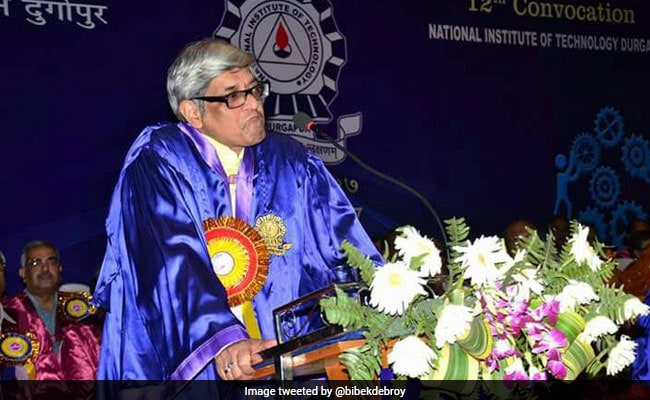Economist Dr Bibek Debroy's Tongue-In-Cheek Take On Bizarre Incidents
Padma Shri awardee Dr Bibek Debroy donned many hats - an economist, political commentator, author, translator, educator and a television anchor.

"A being with a thousand heads, a thousand eyes and a thousand feet" surrounds the entire universe, "yet there is more of him that is left over". Dr Bibek Debroy's explanation of the Supreme in one of his around 50 books almost seems to describe the legacy left behind by him and a reminder of what humans are capable of.
The Padma Shri awardee, described by Prime Minister Narendra Modi as a "towering scholar", sported many hats - an economist, political commentator, author, translator, educator and a television anchor.
However, his latest collaboration was a tongue-in-cheek take on current affairs in a series of short poems called 'Mint Metric'. On October 30, he wrote on the bizarre incident when school children entered an excise office in Kerala and asked the officers there for a light for their beedi rolled with marijuana.
"Entering an excise office in error,
Kerala's school kids froze in terror.
For ganja bidi they sought a light,
But an excise office was hardly right
To make their wish fairer."
A man finding a centipede in a meal served in the IRCTC's VIP lounge should "cause the Railways some disorder", he wrote, while another poem commented on New Zealand imposing a three-minute cap on farewell hugs at airports. Mr Debroy gave a sartorial twist to the bizarre, from a man running a fake court in Ahmedabad for five years to a Greek man sneaking into his neighbour's house to smell their shoes to a UK minister wanting to give obese people weight-loss injections to get them back to work.
Today's Mint Metric in @livemint
Hyderabad's food safety team
Has findings to make you scream.
In hotels and eateries around,
Rats and cockroaches abound,
Clearly a parasite's dream. — Bibek Debroy (@bibekdebroy) October 21, 2024
Mr Debroy, Chairman of the Economic Advisory Council to the Prime Minister of India, who died on Friday at the age of 69, was celebrated for his extensive contributions to economic policy and research. The Bengali boy from Shillong, whose parents migrated from Bangladesh, studied from Delhi School of Economics and Trinity College, Cambridge.
As a theoretical and empirical economist, his contributions spanned the game theory, income inequality, poverty, legal reforms, and railway policy. From 1993 to 1998, he served as Director of a Ministry of Finance and UNDP project on legal reforms, and in 1994-95, he worked with the Department of Economic Affairs. Since its inception, Debroy was an integral part of NITI Aayog, the government's primary think tank.
Mr Debroy chaired the Finance Ministry's 'Expert Committee for Infrastructure Classification and Financing Framework for Amrit Kaal,' an initiative to elevate India's economic standing over the next 25 years.
He also served as the Chairman of the Railways Ministry's high-powered committee on restructuring the country's lifeline.
At the think tank Rajiv Gandhi Institute for Contemporary Studies (RGICS), where he served between 1997 and 2005, a report published under him during then prime minister Manmohan Singh's tenure put Gujarat at the top of an index measuring economic freedom. Amid unease in the Congress and an ensuing heated debate on the Gujarat model of development, Mr Debroy moved to the Punjab Haryana Delhi Chamber of Commerce, following the two-year stint there by a long stint at the Centre for Policy and Research from 2007.
His teaching career included stints at Presidency College, Kolkata (1979-83), Gokhale Institute of Politics and Economics, Pune (1983-87), and the Indian Institute of Foreign Trade, Delhi (1987-93).
His bibliography includes three books centered on economics, one among them 'Getting India Back on Track: An Action Agenda for Reform'. It highlighted the significance of contestation and participation as a counter to "India's primordial nationalisms", to the "authentically and indisputably Indian" creation of a multi-layered political identity.
Dabbling in the themes of spirituality and mythology, Mr Debroy's collection of around 50 authored books includes 43 translations of various Indian texts, most aimed at keeping them accessible and relevant for the youth. He translated the unabridged version of the Mahabharata into English, in a series of 10 volumes. This apart, he also translated the Puranas, the four Vedas, the Bhagvad Gita and 11 major Upanishads.
In fact, in his book The Bhagavad Gita For Millennials, he had written, "He who has not repeatedly heard and studied the Gita, yet desires liberation, will be laughed at by children. But those who hear it and study it are not humans. They are certainly like the Gods." However, his recent book steers away from the theme. Inked in India documents the entirety of recognised fountain pen, nib, and ink manufacturers in India.
Senior Congress leader Jairam Ramesh called Mr Debroy a "thought-provoking commentator" on public issues beyond economics. Union Minister Dharmendra Pradhan remembered his enriching newspaper columns. Debroy also anchored 'Itihasa', a show telecast on Sansad TV. The series explored what is "Bharata", what it means to be "Bhartiya" and what it means in terms of India's Sanatana tradition.






















